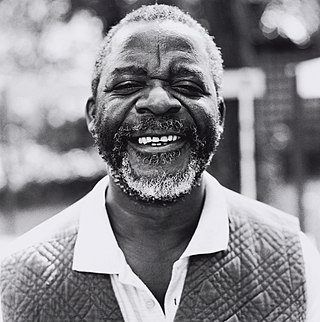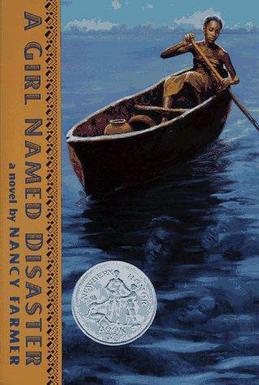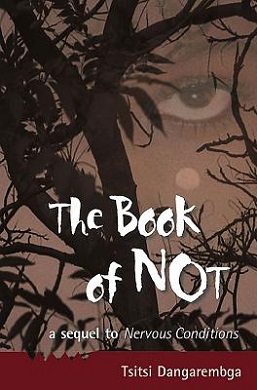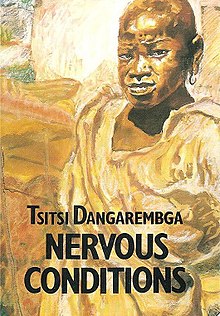
Sir Reginald Stephen Garfield Todd was a liberal Prime Minister of Southern Rhodesia from 1953 to 1958 and later became an opponent of white minority rule in Rhodesia.

Tsitsi Dangarembga is a Zimbabwean novelist, playwright and filmmaker. Her debut novel, Nervous Conditions (1988), which was the first to be published in English by a Black woman from Zimbabwe, was named by the BBC in 2018 as one of the top 100 books that have shaped the world. She has won other literary honours, including the Commonwealth Writers' Prize and the PEN Pinter Prize. In 2020, her novel This Mournable Body was shortlisted for the Booker Prize. In 2022, Dangarembga was convicted in a Zimbabwe court of inciting public violence, by displaying, on a public road, a placard asking for reform.
Everyone's Child is a 1995 film directed by author Tsitsi Dangarembga who became the first black Zimbabwean woman to direct a feature film. The script is based on the 1989 novel Harvest of Thorns by Shimmer Chinodya and stars Elijah Madzikatire, Momsa Mlambo, and Walter Maparutsa. Produced by Zimbabwe's Media for Development Trust (MFD), Everyone's Child was originally conceived as a training video for community-based orphan care programs. Given the explosive growth of AIDS orphans on the continent--at the time of the project's development, predicted to reach 10,000,000 by the year 2000--it was determined that a feature film would have more of an impact in building awareness on the issue.

Neria is a Zimbabwean film made in 1991, written by the novelist Tsitsi Dangarembga. It is directed by Godwin Mawuru and the screenplay was written by Louise Riber. It is the highest-grossing film in Zimbabwean history.

Alexandra Fuller is a British-Rhodesian author. Her articles and reviews have appeared in The New Yorker, National Geographic, Granta, The New York Times, The Guardian and The Financial Times.

Charles Lovemore Mungoshi, was a Zimbabwean writer.

A Girl Named Disaster is a 1996 novel by Nancy Farmer. The book explores the qualities needed to survive in a hostile environment, coming-of-age and the availability of spiritual guidance.

The Book of Not is a novel by Zimbabwean author Tsitsi Dangarembga, published in 2006. The novel is semi-autobiographical, set in colonial Rhodesia. The story is told from the perspective of Tambudzai as she attends a convent boarding school in Rhodesia. In The Book of Not, Tambu's story continues from when it previously left off in the prequel, Nervous Conditions (1988). In May 2018, the BBC named Nervous Conditions as one of the top 100 books that have shaped the world, listing the novel at number 66.
Mutoko is a small town in Mashonaland East province, Zimbabwe. It was established as an administrative station in 1911. It lies 143 km from Harare. It is named after the local chief, Mutoko.

Elleke Boehmer, FRSL, FRHistS is Professor of World Literature in English at the University of Oxford, and a Professorial Governing Body Fellow at Wolfson College. She is an acclaimed novelist and a founding figure in the field of Postcolonial Studies, internationally recognised for her research in colonial and postcolonial literature and theory. Her main areas of interest include the literature of empire and resistance to empire; sub-Saharan African and South Asian literatures; modernism; migration and diaspora; feminism, masculinity, and identity; nationalism; terrorism; J. M. Coetzee, Katherine Mansfield, and Nelson Mandela; and life writing.

Education in Zimbabwe under the jurisdiction of the Ministry of Primary and Secondary Education for primary and secondary education, and the Ministry of Higher and Tertiary Education, Science and Technology Development for higher education. Both are regulated by the Cabinet of Zimbabwe. The education system in Zimbabwe encompasses 13 years of primary and secondary school and runs from January to December. The school year is a total of 40 weeks with three terms and a month break in-between each term.

The Southern Rhodesia Communist Party was an illegal, underground communist party established in Southern Rhodesia which was formed in large part due to the minority settler rule, which had an immensely repressive structure. It emerged in 1941 from a split in the Rhodesia Labour Party. The party consisted of a small, and predominantly white, membership. During the parties existence it had links to other communist parties such as the Communist Party of South Africa and the Communist Party of Great Britain. The party disappeared in the late 1940s, with the exact date of its dissolution not being known. Nobel Laureate Doris Lessing author of various works including “The Grass is Singing,” is the most well known member of the Southern Rhodesian Communist Party.
Flame is a controversial 1996 war film directed by Ingrid Sinclair, produced by Joel Phiri and Simon Bright, and stars Marian Kunonga and Ulla Mahaka. It was the first Zimbabwean film, since independence, to be set in the Rhodesian Bush War. It served as a tribute to the Zimbabwe African National Liberation Army's many female guerrillas.
Lily G. N. Mabura is a Kenyan writer known for her short story How Shall We Kill the Bishop, which was shortlisted for the Caine Prize in 2010.
Zimbabwe has an active film culture that includes films made in Zimbabwe during its pre- and post-colonial periods. Economic crisis and political crisis have been features of the industry. A publication from the 1980s counted 14 cinemas in Zimbabwe's capital city, Harare. According to a 1998 report only 15 percent of the population had been to a cinema. European and American films have been made on location in Zimbabwe as well as Indian films. American films are popular in Zimbabwe but face restrictions limiting their distribution.
A Son of the Soil is the debut novel written by Zimbabwean writer Wilson Katiyo. Published in 1976 by Rex Collings, it follows the life of a young boy, Alexio Shonga, who lives in Southern Rhodesia, the "self-governing" minority-ruled state that preceded independent Zimbabwe. The novel is a close representation of real events Katiyo faced growing up as a black Rhodesian ruled by a white society.
Zimbabwean literature is literature produced by authors from Zimbabwe or in the Zimbabwean Diaspora. The tradition of literature starts with a long oral tradition, was influence heavily by western literature during colonial rule, and acts as a form of protest to the government.
Tsitsi Veronica Muzenda is a Zimbabwean politician, senator of Midlands Province and daughter of the former Vice-President of Zimbabwe, Simon Muzenda.
This Mournable Body is a novel by Tsitsi Dangarembga which was published by Faber and Faber on 16 January 2020.
Joyce Simango is a Zimbabwean author. She became the first female Shona novelist when she published Zviuya Zviri Mberi, or "Good Things are Ahead", in 1974.










